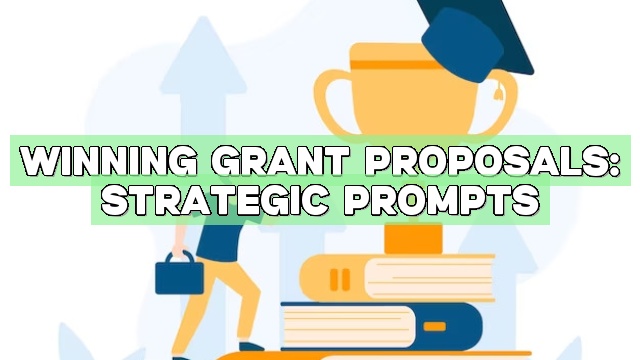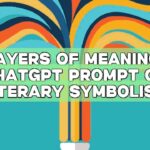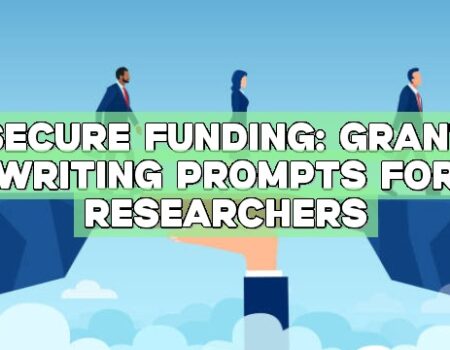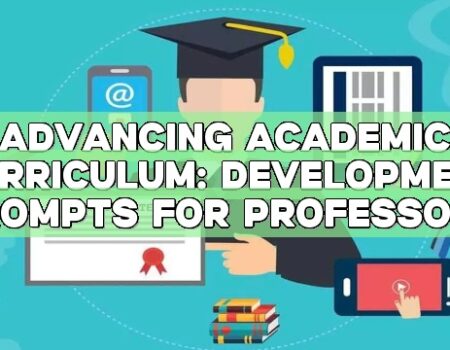When it comes to securing funding through grant proposals, every word counts. Strategic prompts are essential in guiding writers towards clear and concise proposals that resonate with funding agencies. By utilizing effective prompts, writers can improve their chances of success and secure the funding they need for their projects.
This article will provide a comprehensive overview of grant proposals and the key components of an effective proposal. We will also discuss the power of grant proposal prompts and how they can assist in organizing thoughts and crafting impactful proposals. Additionally, we will offer guidance on crafting effective prompts and provide specific examples of prompts tailored to different sections of grant proposals.
Key Takeaways:
- Grant proposal prompts are essential in securing funding through concise and impactful proposals
- This article will provide a comprehensive overview of grant proposals and how prompts can increase funding odds
- Crafting effective prompts is crucial and examples will be provided for specific sections of a grant proposal
Understanding Grant Proposals: A Comprehensive Overview
Grant proposals are essential tools for securing funding for various projects, initiatives, and endeavors. A grant proposal is a formal request made to a funding agency, such as the government or a private foundation, seeking financial assistance for a specific project or program.
A comprehensive grant proposal comprises several components that provide critical information about the proposed project. A standard grant proposal usually includes an abstract, an introduction to the project, a detailed project description, methodology, budget, and evaluation plan.
The abstract is a brief summary of the project that provides an overview of the proposed project’s objectives, methodology, and expected outcomes. The introduction presents background information that sets the project’s context and explains the significance and relevance of the proposal.
The project description provides a detailed account of the proposed project, including the objectives, activities, and expected outcomes. It is crucial to articulate the project’s rationale and demonstrate how it aligns with the funding agency’s mission and priorities.
The methodology section outlines how the project will be executed, including data collection, analysis, and dissemination. The budget section provides detailed information about the project’s funding needs, including expenditure estimates and sources of funding.
The evaluation plan outlines how the project’s outcomes will be measured and assessed. It should clearly define the evaluation criteria and methods, including data sources and analysis methods.
Effective grant proposals require a strategic approach to organize information, articulate a compelling narrative, and convey credibility and expertise. Crafting a successful grant proposal requires careful attention to detail and a thorough understanding of the funding agency’s priorities and guidelines.
Key Components of a Comprehensive Grant Proposal
A comprehensive grant proposal comprises several critical components that are essential to securing funding successfully. The key components include project objectives, budget, methodology, and evaluation plan.
| Components | Description |
|---|---|
| Project Objectives | The objectives of the proposed project should be clearly defined and aligned with the funding agency’s mission and priorities. |
| Budget | The budget should include detailed expenditure estimates, sources of funding, and a clear justification for each expense. |
| Methodology | The methodology section should outline how the project will be executed, including data collection, analysis, and dissemination. |
| Evaluation Plan | The evaluation plan should clearly define the project’s outcomes and how they will be measured and assessed. |
Crafting a grant proposal that effectively communicates the project’s objectives, methodology, and potential impact is crucial to securing funding successfully. A comprehensive overview of the key components of a grant proposal helps writers focus on the most critical aspects of the proposal and articulate a compelling narrative that conveys the project’s value and potential impact.
The Power of Grant Proposal Prompts
Grant proposal prompts are essential tools that help grant writers organize their ideas and structure proposals effectively. They serve as guides that aid in addressing crucial aspects of the proposal, such as project description, methodology, and impact, among others.
By using effective prompts, grant writers can increase the chances of creating compelling proposals that meet the requirements of funding agencies and stand out from the competition. The power of grant proposal prompts lies in their ability to provide a clear and concise direction for the writing process.
Effective prompts encourage grant writers to focus on the essential elements of the proposal and ensure that they provide comprehensive and compelling information. They also help writers avoid common pitfalls like being too vague or providing too much irrelevant information. Thus, the use of prompts significantly enhances the effectiveness of the grant proposal writing process.
Crafting Effective Grant Proposal Prompts
Creating effective prompts for grant proposals is a crucial aspect of securing funding. Well-crafted prompts can guide the writer in addressing key aspects of the proposal, such as project description, methodology, budget, and impact. Here are some guidelines for crafting effective prompts:
1. Clarity
Ensure that the prompts are clear and concise, using language that is easy to understand. Avoid jargon or technical terms that may confuse the reader. Each prompt should have a single focus and avoid asking multiple questions in one prompt.
2. Specificity
The prompts should be specific to the funding agency’s requirements and guidelines. Tailor prompts to suit different funding agencies and ensure each prompt is relevant to the objective of the proposal. Specificity also ensures that the proposal is aligned with the funding agency’s goals.
3. Relevance
It is important that the prompts are relevant to the project and address its unique features and challenges. The prompts should encourage the writer to think deeply about the project, its goals, and its potential impact. This helps to ensure a comprehensive and thoughtful proposal.
4. Examples
Provide examples of well-crafted prompts for different sections of the grant proposal. These examples can help the writer understand the type of language and level of detail required. Including examples can also enhance understanding of how to construct the prompts to match the proposal’s objectives.
5. Review
Review the prompts once they have been crafted to ensure they are comprehensive, well-structured, and relevant. This will help to ensure the prompts work well together and are useful in guiding the writer in crafting a thorough and successful grant proposal.
By following these guidelines, grant proposal writers can craft effective prompts that assist in ensuring a comprehensive and successful proposal. Effective prompts help the writer stay focused and organized throughout the proposal writing process, ultimately increasing the chances of securing funding.
Prompts for Project Objectives and Impact Assessment
Developing clear, concise, and measurable project objectives is crucial in securing funding through grant proposals. Strategic prompts can help grant writers to focus on the most important aspects of their projects and align them with the funding agency’s goals. Additionally, assessing the potential impact of the proposed project provides a compelling case for why the project should be funded. Here are some prompts that can help with project objectives and impact assessment.
Prompts for Project Objectives
- What is the overarching goal of the project?
- What specific objectives will be achieved through the project?
- How will the objectives be measured?
- What is the timeline for achieving the objectives?
- How do the objectives align with the funding agency’s goals?
These prompts can help grant writers to define project objectives that are specific, measurable, achievable, relevant, and time-bound (SMART).
Prompts for Impact Assessment
- What are the potential outcomes of the project?
- How will the outcomes be measured?
- What is the significance of the outcomes?
- What is the likelihood of achieving the outcomes?
- What is the potential impact on the target population or community?
These prompts can help grant writers to assess the potential impact of their projects and present a compelling case for why the project should be funded. Additionally, it is recommended to use specific indicators of success that are relevant to the project’s goals, such as increased literacy rates or improved health outcomes.
Writing Prompts for Budget Planning and Justification
Budget planning and justification are crucial components of a grant proposal. A well-crafted budget can demonstrate the feasibility and sustainability of the proposed project. Effective prompts can help writers prepare a comprehensive and transparent budget that aligns with the project objectives and the funding agency’s guidelines. Here are some writing prompts to guide you in budget planning and justification:
| Prompt | Explanation |
|---|---|
| Define the project’s budget categories | Identify and prioritize the main budget categories, such as salaries, equipment, supplies, travel, and indirect costs. Determine the estimated budget for each category. |
| Breakdown the expenses | List the specific items and activities that contribute to each budget category. Estimate the cost of each item and activity, and provide a detailed justification for each expense. |
| Calculate the cost-effectiveness | Calculate the cost per unit or per outcome of each expense. Demonstrate the cost-effectiveness of the proposed project by comparing it with similar projects or industry standards. |
| Align the budget with the project objectives | Ensure that the budget supports the project objectives and is realistic in terms of available resources. Avoid overestimating or underestimating the budget, and provide a contingency plan for unexpected expenses. |
These prompts can help you develop a clear and compelling budget for your grant proposal. Remember to follow the funding agency’s guidelines and to provide realistic estimates and justifications for each expense. A well-crafted budget can not only increase the chances of securing funding but also demonstrate your ability to manage resources effectively.
Prompts for Methodology and Evaluation Strategies
Developing a well-defined methodology and evaluation framework is crucial for any grant proposal. Using prompts can help writers structure their thoughts and ensure they cover all important aspects of the project. Here are some effective prompts for the methodology and evaluation sections of a grant proposal:
Methodology
- Define the research question or hypothesis:
- Specify the research design:
- Identify the sampling strategy:
- Outline data collection methods:
- Describe data analysis plan:
What research question or hypothesis is the project attempting to address?
What research design will be used to answer the research question or test the hypothesis?
What is the sampling strategy and sample size?
What methods will be used to collect data? How will data quality be ensured?
What analytical techniques will be used to analyze the data, and why were they chosen?
Evaluation Strategies
- Outline the evaluation framework:
- Identify the evaluation criteria:
- Specify the data sources and collection methods:
- Debate the data analysis plan:
What is the overall evaluation framework, and how will it be used to guide the evaluation?
What are the evaluation criteria for assessing the project’s success?
What are the key data sources for evaluation, and what methods will be used to collect the data?
What analytical techniques will be used to analyze the evaluation data, and why were they chosen?
By using prompts to guide the methodology and evaluation sections of a grant proposal, writers can ensure they cover all the required information in a clear and organized manner.
Long-form Prompts for Complex Grant Proposals
Long-form prompts can be invaluable when tackling complex grant proposals. These prompts provide the necessary background information and context for the proposal, ensuring clarity and completeness. Here are some examples of long-form prompts that can aid in crafting effective grant proposals.
| Prompt | Description |
|---|---|
| Provide a brief history of the project: | This prompt encourages writers to provide the funding agency with a detailed background of the project, including past accomplishments, current challenges, and future goals. |
| Explain the anticipated challenges and risks: | This prompt instructs writers to identify potential hurdles that the project may face, along with possible solutions, contingency plans, and risk mitigation strategies. |
| Describe the stakeholders and beneficiaries: | This prompt prompts the writer to clearly identify the various stakeholders and beneficiaries of the proposed project, including demographics, geographic locations, and specific needs. |
| Outline the collaboration and partnership plan: | This prompt encourages grant proposal writers to detail the partnerships and collaborations involved in the project, including the roles and responsibilities of each partner. |
| Provide an overview of the timeline and milestones: | This prompt instructs writers to lay out a clear timeline of the project, including key milestones, deliverables, and deadlines. |
Using long-form prompts can be especially beneficial for complex grant proposals, as they help ensure that all necessary information is included and presented in a logical and clear manner. It’s important to tailor prompts to the specific needs of each grant proposal and funding agency, to increase the chances of securing funding.
Prompts into Action: Real-life examples
Applying strategic prompts in grant proposal writing can significantly increase the chances of securing funding. Here are some real-life examples of grant proposals that utilized prompts effectively:
Example 1: Education Project
Project Objective Prompt: Define the educational outcomes you aim to achieve through your project, including measurable goals and objectives.
Response: Our project aims to improve literacy rates among students in underserved communities. Our primary objective is to increase reading proficiency by 30% among students in grades 1-3 over the next year.
Impact Assessment Prompt: Describe how you plan to measure the impact of your project on the target population.
Response: We will conduct pre/post assessments of students’ reading proficiency levels to track progress over the project period. We will also collect feedback from teachers and parents to evaluate the project’s effectiveness.
Example 2: Healthcare Initiative
Budget Planning Prompt: Provide a detailed budget breakdown for all project expenses, including personnel, equipment, and resources.
Response: Our budget includes personnel costs for hiring a project coordinator and two nurses, equipment costs for purchasing medical supplies and technology, and resources costs for training and outreach activities.
Methodology Prompt: Outline the research methods you will use to evaluate the effectiveness of your project’s healthcare interventions.
Response: We will conduct randomized controlled trials to compare the outcomes of patients receiving our healthcare interventions to those receiving standard care. We will also collect qualitative data through patient surveys and focus groups to evaluate patient satisfaction and engagement with our interventions.
Example 3: Environmental Conservation
Long-form Prompt: Provide a detailed background on the environmental issue you are addressing and explain the significance of your proposed project in mitigating these issues.
Response: Climate change poses a significant threat to the environment, with rising temperatures and sea levels contributing to the loss of biodiversity and natural resources. Our proposed project aims to mitigate the effects of climate change by promoting sustainable land use practices and reducing greenhouse gas emissions through tree planting initiatives and renewable energy investments.
These real-life examples demonstrate how strategic prompts can guide grant proposal writers in developing effective grant proposals. By providing clear guidance on project objectives, impact assessment, budget planning, methodology, and evaluation strategies, prompts help ensure that critical aspects of a grant proposal are addressed.
FAQ
Q: How can strategic prompts improve the chances of winning grants?
A: Strategic prompts help guide grant proposal writers in addressing key aspects of their proposals, ensuring they cover all necessary information and present a compelling case for funding. By using prompts, writers can organize their thoughts, structure their proposals effectively, and increase the chances of securing grants.
Q: What are the key components of a grant proposal?
A: Grant proposals typically include project objectives, budgets, evaluation plans, and a detailed project description. These components are crucial in demonstrating the feasibility, impact, and effectiveness of the proposed project.
Q: How do prompts help in crafting effective grant proposals?
A: Prompts provide guidance and structure for grant proposal writers, aiding in the development of key sections such as the project description, methodology, and impact assessment. By using prompts, writers can ensure they address important points and present their proposals in a clear and compelling manner.
Q: How can I create effective prompts for grant proposal writing?
A: When crafting prompts, it is important to focus on clarity, specificity, and relevance. Prompts should be tailored to the requirements of the funding agency and designed to elicit detailed and relevant responses. By creating effective prompts, writers can enhance the quality of their proposals and increase their chances of success.
Q: Are there specific prompts for project objectives and impact assessment?
A: Yes, prompts for project objectives and impact assessment help grant proposal writers define measurable outcomes, align their objectives with the funding agency’s goals, and evaluate the potential impact of their proposed projects. These prompts assist in presenting a strong case for funding.
Q: What prompts can assist in budget planning and justification?
A: Prompts for budget planning and justification help writers accurately estimate costs, breakdown expenses, and justify the budget in alignment with the project objectives. These prompts ensure transparency and cost-effectiveness in the proposal.
Q: How do prompts aid in developing methodology and evaluation strategies?
A: Prompts for methodology and evaluation strategies guide grant proposal writers in outlining research methods, data collection techniques, analysis approaches, and developing a comprehensive evaluation framework. These prompts ensure clarity and effectiveness in the proposed project’s implementation and assessment.
Q: When should longer prompts be used in grant proposals?
A: Longer prompts are particularly useful when dealing with complex grant proposals that require additional background information and context. Using longer prompts can ensure clarity and completeness in addressing the complexities of the proposed project.
Q: Can you provide real-life examples of grant proposals using strategic prompts?
A: Yes, we showcase real-life examples of grant proposals where strategic prompts were used effectively. These examples include sample prompts and corresponding responses generated by ChatGPT, providing inspiration and valuable insights for grant proposal writers.









